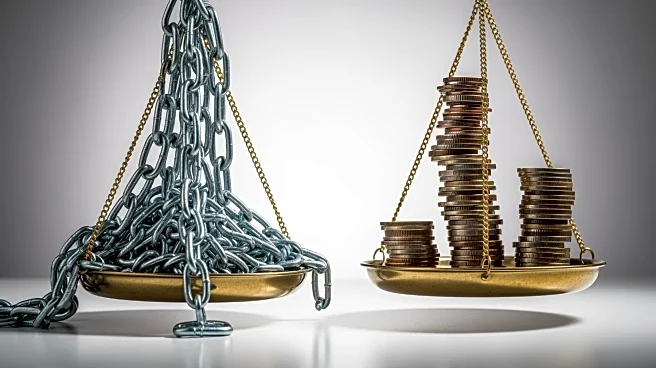What's Happening?
A recent poll conducted by ABC News/Washington Post/Ipsos reveals that a significant majority of Americans feel the impact of tariffs on their personal finances, particularly in terms of increased spending on groceries and utilities. The survey indicates
that about 70% of Americans are spending more on groceries compared to the previous year, while 60% report higher utility costs. The poll highlights that 65% of Americans disapprove of President Trump's handling of tariffs, with a notable 55% stating that tariffs have worsened their family's financial situation. The survey also shows that a majority believe tariffs contribute to inflation and negatively affect the U.S. economy and the economies of countries facing these tariffs. The poll was conducted online with a sample of 2,725 U.S. adults and has a margin of error of plus or minus 1.9 percentage points.
Why It's Important?
The findings of this poll underscore the widespread perception that tariffs are contributing to financial strain for American families. As inflation continues to rise, the increased cost of living, particularly in essential areas like groceries and utilities, is a significant concern for many. The disapproval of tariff policies, especially among Democrats and independents, suggests potential political ramifications for President Trump and his administration. The perception that tariffs are harming the economy could influence public opinion and voter behavior, particularly as the Supreme Court is set to hear arguments regarding the use of emergency powers to impose these tariffs. The economic implications extend beyond individual households, potentially affecting broader economic stability and international trade relations.
What's Next?
The Supreme Court's upcoming review of President Trump's use of emergency powers to impose tariffs could lead to significant legal and political developments. Depending on the Court's decision, there could be changes in tariff policies, which may alter the economic landscape and impact public opinion. Additionally, as inflation and cost of living concerns persist, there may be increased pressure on policymakers to address these issues through legislative or executive actions. The ongoing debate over tariffs and their economic impact is likely to remain a contentious topic in U.S. politics, influencing future policy decisions and electoral outcomes.


















